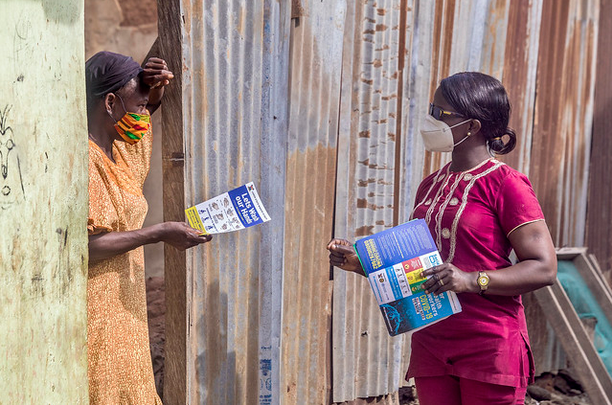Behavioral Insights from Vaccine Adoption in Nigeria: Cross-Sectional Survey Findings

Stanford University (Agha); Behavioral Insights Lab (Agha, Bernard, Francis); Centre for Family Health Initiative (Nsofor); Virtual Labs (Rao)
"The need for a behavior model that can be used to explain the vaccine adoption process in simple terms that resonate with practitioners is urgent."
Despite multiple studies showing a weak relationship between risk perception and willingness to adopt a COVID-19 vaccine in Nigeria, researchers continue to recommend the provision of factually correct information. There is very limited guidance available to support Nigerian practitioners in designing interventions that might accelerate COVID-19 vaccine uptake due to the absence to date of a clearly articulated framework for understanding vaccine-related behaviour. Thus, this study draws on the practitioner-friendly Fogg Behavior Model (FBM), using an inexpensive digital survey to help identify the drivers of COVID-19 vaccination in Nigeria.
The FBM is a model of human behaviour rather than a model of health behaviour per se. On the FBM, behaviour happens when motivation, ability, and a prompt happen at the same moment.
- The FBM defines motivation as having 3 components: anticipation, sensation, and belonging. Anticipation reflects the hopes and fears a person associates with a behaviour. Sensation reflects the pleasure or pain a person associates with a behaviour. Belonging is reflected by the acceptance or rejection of the behaviour by people whose opinions a person considers important.
- The FBM defines ability in terms of 5 barriers: time, money, the physical effort required to adopt a behaviour, the mental effort required to adopt a behaviour, and whether the behaviour fits into the person's routine.
- Behaviour occurs when a person whose motivation and ability are above the action line is prompted.
The researchers designed and conducted a cross-sectional survey with multistage sampling. Using a Meta Messenger chatbot, they collected data from 957 Nigerians (aged 18 years and above) from 120 strata based on age, sex, state, and urban or rural location. The researchers ran separate logistic regression models to examine the relationships between vaccine uptake and core motivators, ability barriers, and sociodemographic variables. A final model that predicted vaccine uptake included all 3 sets of variables.
About 56% (n=540) of respondents reported that they had received at least 1 COVID-19 vaccination. Three core motivators were positively associated with vaccine uptake: the belief that the COVID-19 vaccine promised a better life (adjusted odds ratio [aOR] 3.51, 95% confidence interval [CI] 2.23-5.52), the belief that the vaccine would allow respondents to do more things they enjoyed (aOR 1.97, 95% CI 1.33-2.93), and respondents' perception that their friends and family members accepted their decision to get vaccinated (aOR 1.62, 95% CI 1.06-2.48). Two ability barriers were negatively associated with vaccine uptake: Cost- or income-related concerns lowered the odds of being vaccinated (aOR 0.35, 95% CI 0.24-0.50), and the lack of availability of vaccines at places respondents routinely visited also lowered their odds of being vaccinated (aOR 0.29, 95% CI 0.21-0.40). After adjusting for other variables, the perceived fear of getting COVID-19 and the hardship associated with the disease were no longer associated with vaccine uptake.
In short, the study finds that: Hope is more important for Nigerians than fear when it comes to vaccine adoption, social approval is more powerful than social disapproval, and enjoying life is more important than worrying about getting the disease. "These findings suggest that an approach that is based on increasing the perception of hope and pleasure associated with vaccine adoption as well as increasing network members' social approval is likely to increase COVID-19 vaccine adoption in Nigeria." The analysis also suggests that financial considerations play an important role in the uptake of COVID-19 vaccination in Nigeria. "Consistent with this finding, making COVID-19 vaccines available at places that Nigerians visit routinely may have a large impact on vaccine uptake."
Despite the inability to generalise these findings beyond Nigerians who are on Facebook and Instagram, survey findings could be used to:
- Design interventions on digital platforms as well as to evaluate the effectiveness of those interventions. Digital behaviour change interventions may be evaluated by experimental studies on digital platforms that compare vaccine uptake between intervention and control groups. "High exposure to messages that associate the COVID-19 vaccination with a better, more fulfilling life is achievable through advertising on digital platforms and at a fraction of the cost of advertising on traditional mass media channels such as television."
- Conduct qualitative research to determine which motivation or ability factors are relevant in locations where interventions are planned.
In conclusion: "The use of a behavior model to understand drivers of COVID-19 vaccine uptake in Nigeria has helped provide a different perspective on vaccine-related decision-making in Nigeria than what is currently available in the published literature....By comparison to behavior models that focus on perceived risk of and susceptibility to disease, the FBM situates behavior within the broader context of a person's life."
Interactive Journal of Medical Research 2024;13:e47817. Image credit: Nigeria Centre for Disease Control via CDC Global on Flickr (CC BY 2.0 Deed)
- Log in to post comments
